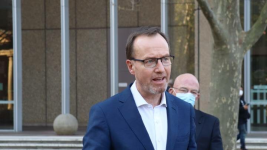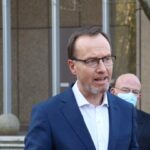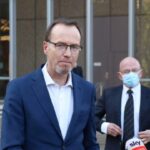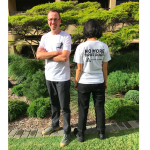“Changing the National Debate”: Senator David Shoebridge on the Greens Agenda

The 47th Australian parliament sat for the first time on Tuesday. This saw the Albanese government taking the reins in the two chambers, the composition of which has dramatically changed since the country took to the polling booths in late May.
The 2022 federal election was significant as it saw a sizable portion of the national constituency turning away from both the majors, and preferencing minor parties, especially the Greens, and teal independents, who were all offering more robust action on climate and government corruption.
This shift in focus has already been apparent in the national debate over the two intervening months, as we’ve seen the Albanese government promise action on climate and to roll out a national integrity commission, while it’s been enhancing diplomatic relations trashed by Morrison.
But perhaps the greater difference recently seen in the coverage relating to climate action is that instead of watching the two majors, Labor and the Coalition, exchanging opposing wants, the focus has been on how the Greens might broaden the climate reforms the government has on offer.
The progressive shift
Newly-elect Greens Senator David Shoebridge explained right before the federal election that the best possible outcome was for his party to gain 12 seats in the Senate, which would provide it with balance of power in the upper house. And that’s what it’s achieved.
Labor holds 26 seats in the Senate, while the Liberal Nationals have 32. So, in order for the government to pass any bill that the Coalition opposes in the upper house, the support of the Greens is essential.
The outcome of the national vote was further hailed a greenslide, as not only did the Greens pick up balance of power, but it secured four lower house seats, while the pro-climate teal independents now hold ten House of Representatives seats and one upper house position.
This progressing shift in Australian politics was further evidenced when, on the eve of the first parliamentary session, Labor announced it will be redrafting its key climate bill in order to gain the support of the Greens in passing it.
Forging justice
Senator Shoebridge is the Australian Greens justice spokesperson, which is a role that saw him forge significant change in the jurisdiction of NSW, whilst he was a member of that state’s upper house. And its justice reform, or more specifically anticorruption, that further led to the greenslide.
Along with an eye to his party’s agenda on climate, Shoebridge is prioritising that government establishes a robust national integrity agency, that adequate whistleblower protections are enacted, that the age of criminal responsibility be raised, and that Don Dale child prison be shut down.
Sydney Criminal Lawyers spoke to David Shoebridge about what sort of powers will ensure a federal ICAC has bite, the fact that whistleblower prosecutions are continuing under laws acknowledged a failure, and how Don Dale Youth Detention Centre is a racist afront.
Over the last fortnight, the Albanese government has raised a charge against the Greens, implying that it’s threatening Australian progress on climate change.
Labor is pushing for 43 percent emissions reduction, which is not nearly enough, considering NSW is now a swamp and London’s burning.
The Greens, however, are calling for a 75 percent reduction. So, the Albanese government’s argument doesn’t quite add up. David, what’s going on here?
We’re very clear about what our position is. We want legislation that will keep coal and gas in the ground. That is the task in front of this parliament, and that’s what millions and millions of Australians voted for.
The Albanese government can have as much climate action as they reach for. It’s a question of the ambition of Labor.
They should see this as an amazing opportunity to turn Australia from an international pariah on climate, to actually leading the charge, so we can keep future generations safe.
The Labor emissions reduction legislation is set to be one of the first bills on the agenda this week. Your party has suggested it will support the legislation if the government comes to the table with broader reforms.
What might these look like?
We want to improve and pass this legislation. But the real focus here is not just getting a bill through parliament, the focus here is keeping that coal and gas in the ground, which means stopping the subsidies to fossil fuel corporations.
That means pulling the public funding that is currently slated to open up the Beetaloo Basin, which is opposed by every climate scientist and First Nations peoples.
These are the very specific tasks in front of this parliament, and that is what we will press for, not just in this bill, but in the budget and every piece of legislation that follows.
The other big issue that saw large numbers of voters turning away from the majors was that of government corruption, and the need for a federal ICAC.
Labor has flagged moving its own integrity commission legislation. The 2020 Haines bill is still before parliament, and there’s the Greens model that was passed in the Senate in late 2019.
So, is a watchdog with sharp enough teeth on the cards?
The real challenge here is moving from an adequate ICAC to a best practice national ICAC.
We need to make sure that the new federal anticorruption commission cannot only look at corrupting behaviour within government but look at corrupting behaviour within corporate Australia which is designed to corrupt government processes and policy outcomes that are against the public interest, but in favour of corporate interests.
That’s an area we’re continuing to have discussions with Labor on. And it’s one that’s going to be critical to having a broad-based anticorruption commission.
We have large areas of agreement with Labor about retrospectivity. But it’s about the scope of the commission and ensuring that it can chase corruption down that impacts our national government, wherever that corruption is occurring.
Attorney general Mark Dreyfus has pulled the plug on the Collaery prosecution. However, David McBride and Richard Boyle continue to face the courts under the laws set out in the Public Interest Disclosure Act, which have been recognised as flawed and are slated for an overhaul.
What should be happening here in relation to the prosecutions and the legislation?
The attorney general, quite properly, has acknowledged that Australia’s whistleblower laws are inadequate.
We have a series of prosecutions against brave whistleblowers commenced under the former Coalition government that continue to grind their way through the courts under Labor.
That is plainly wrong. These are prosecutions that the attorney general should end using his power, an extraordinary power, to end Commonwealth prosecutions.
However, this isn’t just about one or two cases. This is also about getting those structural reforms in place as soon as possible, so that we have a national whistleblowers commission, a national commissioner and laws that futureproof whistleblower protections, regardless of who’s in government.
Over recent weeks, you’ve also been raising the closure of Darwin’s Don Dale youth prison, along with Greens Senator Lidia Thorpe.
This facility, which was revealed to be torturing First Nations kids over half a decade ago, continues to be operating in a consistently harmful manner. How can this be the case? And what’s the alternative?
Six years on from the Royal Commission that found that Don Dale was an institution that systemically abused First Nations kids, it’s still operating.
We have the Northern Territory government committing more funds to renovate it and expand Don Dale. It is impossible to believe that’s where we are six years after the Royal Commission.
There is a compelling case for the Commonwealth attorney, if necessary, with the assistance of parliament, to shut down Don Dale. And to use this as a first step in a national campaign to raise the age and bring kids out of gaol across the country.
When you look at Don Dale on any given night, between 90 and 100 percent of those kids are First Nations kids. Some are as young as 10. That is an abusive institution that should be shutting tomorrow.
And lastly, David, when we last spoke right before the federal election, you described why the Greens holding balance of power would be a gamechanger. Your party now has those seats in the upper house.
So, how is your party expecting its enhanced ability to push progressive agendas is going to shape the coming term of parliament?
Well, Paul, I am getting sworn in tomorrow. And our work has already started: working to negotiate with the Labor government and working out our strategies as a party room to maximise our power, especially in the Senate where we have the balance of power.
What I hope is that in three years’ time, the Australian public will judge us on what we have achieved and how we have changed the national debate.
This is a once-in-a-generation opportunity to have a parliament that delivers climate justice, that looks out for those with the least in our society, and that remakes some key institutions from our workplace to our homes and to parliament itself.
This is going to be an extremely tough three years getting Labor to move where we need them to, but that is the challenge, and we will be judged on the results.







